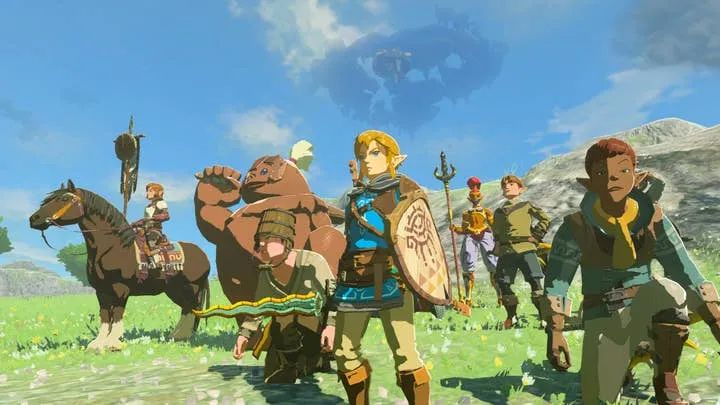Every department will go through cycles of expansion and contraction, and what we are seeing is the readjustment after the COVID-19 pandemic…
Author: James Batchelor
Translation: GameRes
Since the beginning of 2023, the wave of layoffs in the gaming industry continues.
In just the past few weeks, Ascendant Studios, Beamdog, Crystal Dynamics, Roblox, Blizzard, Epic Games, Team17, Naughty Dog, Twitch, and Keywords have all laid off a number of employees, with Epic's layoffs exceeding 800 people. The reasons behind the layoffs at gaming companies vary. For example, the layoffs at Crystal Dynamics and Beamdog are part of Embracer's restructuring plan, while Keywords' layoffs are due to BioWare's decision to terminate an outsourcing service contract with the company. However, the frequency of these layoffs becoming headline news in a short period of time indicates that there are evidently more widespread issues in the gaming industry.
So why are gaming companies laying off employees? Analysts, recruiters, and investors in the industry have mentioned numerous factors reflecting the current economic environment, including high interest rates, inflation, slowing market growth, rising development costs, and increased competition. In fact, these challenges have also led to large-scale layoffs at tech giants such as Microsoft, Meta, and Amazon.

Serkan Toto, CEO of Kantan Games
"In the past 18 months, the importance of 'efficiency' in the gaming industry has significantly increased," said Serkan Toto, CEO of Kantan Games. "Compared to the past, game companies are much more urgent in the need to save costs and streamline their organizational structure. Faced with pressure, CEOs in the gaming industry have had to wield the heavy hammer to deal with the biggest cost block, which is the employees. This is what we are seeing in 2023."
"The general idea of these CEOs is: 'If we don't lay off employees, our competitors will, and then use efficiency to eliminate us.' Therefore, people are being laid off everywhere… At the same time, they often believe that at any given time, 15% to 20% of the company's employees are redundant."
Spike Laurie, partner at venture capital firm Hiro Capital, pointed out that the current wave of layoffs in the gaming industry can be traced back to a specific event: in November 2022, Elon Musk laid off 50% of Twitter's employees.
"He (Musk) found from employees' electronic passes that there were more people getting food at the cafeteria than actually eating in the cafeteria," Laurie said. "This prompted other business leaders to carefully examine the size of their companies and provided the impetus for wise layoffs. Why? Driven by the reliance on cheap and readily available funds, we have reached the end of an economic cycle. A year later, we see large-scale layoffs in the gaming industry, resulting in many talented people losing their jobs and economic security. Unemployment is particularly painful for those affected by soaring prices of essential goods such as energy and food."
Emilie Avera, Senior Vice President of Consulting at IDG, added that in gaming companies (especially public companies), there is a "significant gap" between the compensation of executives and ordinary employees, making large-scale layoffs even more embarrassing.

Emilie Avera, IDG Consulting
"While measures such as layoffs can effectively reduce costs and temporarily improve the balance sheet, the total compensation of executives has not decreased accordingly," Avera said. "In terms of executive compensation, the current priority is to build a 'performance-based compensation' model, strictly linking executive compensation to actual results and performance indicators: if the company's performance fails to meet pre-set targets, executives should take a pay cut."
In addition, the pandemic has inevitably affected the current state of the gaming market. According to Avera, the gaming industry experienced rapid expansion under the "stay-at-home economy," but this situation was not expected to last long.
"As funds begin to dry up, gaming companies are forced to re-evaluate the allocation of funds, and layoffs have become a direct solution to cutting expenses," she explained. "Many companies have been eager to expand over the past two to three years, hastily making a large number of acquisitions in order to quickly obtain economic returns, but lacking sufficient due diligence and poor budget management, often at the expense of sustainable profitability… These crazy practices have instead hindered the industry they originally intended to develop vigorously."
Avera noted that in this respect, the gaming industry has many similarities with the entertainment industry: streaming platforms prioritize attracting more audiences rather than improving profitability. Now, major streaming platforms are "repairing their unsustainable model" by raising prices, and the gaming industry is also experiencing a "similar reckoning."
Liz Prince, director of the gaming recruitment company Amiqus, stated that from a recruitment perspective, the current situation in the gaming industry is more like a readjustment and does not reflect any deeply rooted industry issues that are cause for deep concern.
"First and foremost, I want to express sympathy to everyone who has been affected by recent layoffs and studio closures," Prince said. "There is no doubt that this is a challenging period, and we are deeply concerned about the many talented people facing unemployment. However, every industry goes through cycles of expansion and contraction, and the gaming industry is no exception. During the pandemic, the growth of the gaming market prompted many companies to rapidly expand, engage in acquisitions, or over-invest in certain areas, and now they need to readjust. It is worth noting that while some studios are facing challenges, many other studios are expanding."
Piers Harding-Rolls, Director of Games Research at Ampere Analysis, also shares the same sentiment. "This is not a new phenomenon, especially in times of economic downturn. Of course, considering the budget scale of modern large-scale games, the cancellation of a single project could lead to hundreds of people being laid off, which has a greater impact on the industry than in the past. Just two or three years ago, talent shortage was a hot topic in the gaming industry, and many studios were fiercely competing for top talent… For larger companies, this is also part of the reason they made a large number of acquisitions from 2019 to early 2022."
Harding-Rolls added that the merger and acquisition frenzy of the past few years was also driven by "overvalued gaming companies" (peaking during the pandemic) and cheap loans. However, since Microsoft announced its record-breaking acquisition of Activision Blizzard, the cost of debt has risen rapidly, and the valuation of gaming companies has declined.

Laurie pointed out that many gaming companies have been accommodating "large, unprofitable teams." "For a while, loans and investment were too easy, so too many new teams produced an excessive number of games," he said. "A large amount of funds flowed into untested blockchain and metaverse studios, driving up (employee) salaries, but those studios failed to launch any games."

Spike Laurie, Hiro Capital
Avera mentioned another factor: nowadays, players are buying fewer games and spending more time in their favorite game series. As the market continues to shift towards service-based games, this trend is likely to accelerate. Even single-player games will consume more of players' time, such as "Baldur's Gate 3" and "The Legend of Zelda: Breath of the Wild," which have main story completion times of over 50 hours. "All developers have to do everything they can to grab as much attention as possible from discerning players," she said.
Recruitment agency One Player Mission's boss Kim Parker-Adcock pointed out that since the end of the pandemic, people's spending habits have expanded once again. "People will use disposable income for outings, international vacations, or various activities. There are still die-hard gamers who will spend all their money on games, but there are far fewer people willing to spend money on new consoles than two or three years ago, because in terms of price, they are almost like luxury items… Sony's latest exclusive games no longer land on the PS4, so if you want to play, you have to spend over 400 pounds to buy a PS5."
Karol Severin, co-founder and senior analyst at Midia Research, added, "The growth rate of the gaming industry has peaked. In the future, the revenue of the entire industry will continue to grow, but mainly driven by population growth and improvements in internet conditions, rather than the improvement of the gaming business itself. With the growth of cloud gaming subscriptions, the demand for high-priced games by players will decrease. When the streaming subscription model really takes off, the gaming industry will face similar pressures to the music and video industries. The perceived value of individual games will inevitably decrease in the eyes of consumers, leading to a reduced demand for games and a decrease in the number of developers and publishers."
Severin also pointed out that the growth rate of the number of games far exceeds the growth rate of global gaming revenue. For example, it is expected that in 2023, over 13,500 new games will be released on the Steam store, higher than last year's figure of 12,500. In addition, companies that do not rely on games for their business models (such as Netflix, Amazon, and Apple) are also competing for more market share in the gaming market.
Regarding the future development direction of the gaming industry, Avera shared some of her thoughts. Avera believes that generative AI can be used to assist (but not replace) labor-intensive development teams, reducing the development time of game products; user-generated content (UGC) may also become a way to reduce development costs. She also mentioned that over time, more developers will outsource tasks such as art, programming, and sound production to outsourcing service companies like Virtuos and Keywords, allowing them to focus on their core strengths.
Avera emphasized that gaming companies also need to manage their expectations for performance wisely. "To get back on track, gaming companies and investors need to align on realistic KPIs and stick to them," she said. "Although positive sentiment from players about a game on social media may be exciting, it does not necessarily mean the game will be a bestseller. Before making investment decisions, we should evaluate tangible indicators such as review scores, pre-order numbers, and the number of bugs."

"Undeniably, some studios may face further financial pressure and make additional adjustments, including continuing layoffs… But no magic bullet can solve the problem of layoffs, as many factors behind the layoffs are beyond the control of the gaming industry, such as inflation, high interest rates, and so on," Severin added. "Although many people are pessimistic about the future, the gaming industry will not disappear, and its value this year is still expected to reach around $187 billion. If gaming companies are considering new projects, careful planning of profit routes (rather than how to promote user growth) will become increasingly important. In addition, we expect that in the future, games that focus on meeting the needs of niche market players rather than competing for mainstream audiences will achieve greater success."

Toto believes that the wave of layoffs in the gaming industry will not dissipate quickly. "From an external perspective, some studios still seem to have an excess of manpower. Personally, I guess that from now until the end of 2024, we will see more bad news."
Prince pointed out that with their accumulated skills and expertise, gaming professionals affected by layoffs are "still very much in demand" and will be able to find work at other companies. Parker-Adcock also noted that as some studios downsize, new studios often emerge in the industry. "These new studios are still in the growth stage, but the key is to avoid overspending and ensure that the team can survive, only hiring talent for key positions."

Liz Prince, Amiqus
Laurie concluded that while the future of the gaming industry "seems challenging," with the rise of Generation Z and the widespread adoption of gaming technology by major tech companies such as Meta and Apple, practitioners still have reason to be optimistic about the future.
"If this round of layoffs in the gaming industry becomes the catalyst for developers to create new games in a more streamlined, efficient, and creative way, then we will all benefit from it," Laurie said. "We must remember how fortunate we are to work in such a thriving industry. As the macroeconomic environment improves, the gaming industry will certainly be at the forefront of driving economic and employment growth. In the new forward-looking digital economy, our skills will be very valuable."
免责声明:本文章仅代表作者个人观点,不代表本平台的立场和观点。本文章仅供信息分享,不构成对任何人的任何投资建议。用户与作者之间的任何争议,与本平台无关。如网页中刊载的文章或图片涉及侵权,请提供相关的权利证明和身份证明发送邮件到support@aicoin.com,本平台相关工作人员将会进行核查。




